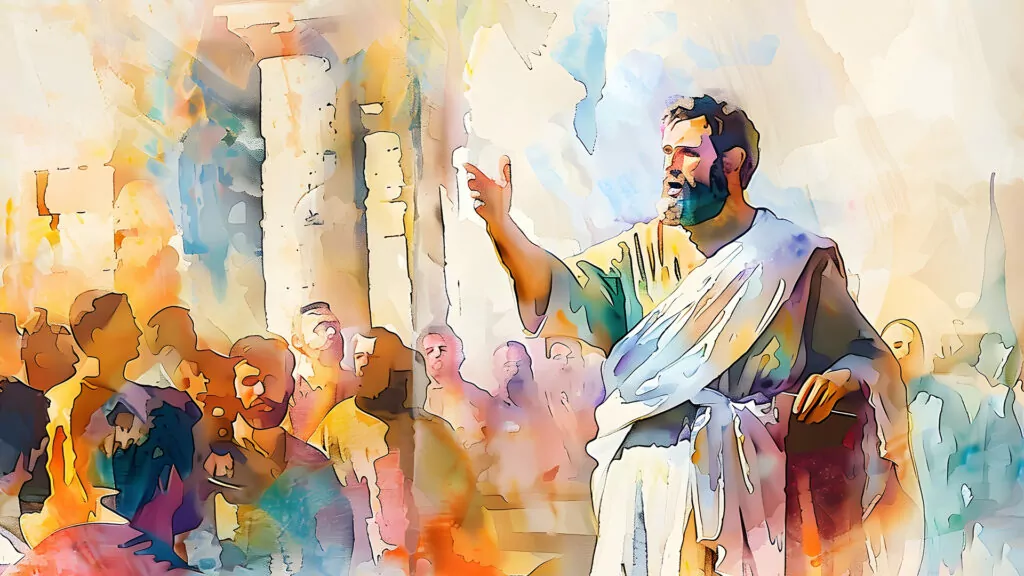Christians want to present the gospel is a nice polite manner. But in a world that is increasingly treating Christian truth as inherently offensive, we’re facing the reality that we can either be perceived as polite, or we can clearly state God’s Truth. In this excerpt from Ichabod Spencer’s A Pastor’s Sketches, the author shows there are real benefits to be had in clarity. The excerpt begins with Rev. Spencer (1798-1854) at a revival meeting where people have come specifically to seek God.
*****
It was on one of those evenings, when about seventy persons were present, and I was passing rapidly from one to another, that I came to an individual who had never been there before. Said I: “What is the state of your feelings on the subject of your salvation?”
“I feel,” said he, “that I have a very wicked heart.”
“It is a great deal more wicked than you think it,” said I; and immediately left him, and addressed myself to the next person.
The arrow driven deeper
I thought no more of it till a few days afterwards, when he came to me with a new song in his mouth. He had found peace with God, as he thought, through faith in Jesus Christ.
Said he: “I want to tell you how much good you did me. When I told you that I had a very wicked heart, and you answered that it was a great deal more wicked than I thought, and then said nothing more to me, I thought it a most cruel thing. I expected something different. I thought you would say more, and my soul was wonderfully cast down. I did not believe you. I was angry at your treatment. I thought you did not care whether I was ever saved or not; and I did not believe you knew anything about my feelings. But the words rung in my ears, ‘A great deal more wicked than you think.’ I could not get rid of them. They were in my mind the last thing when I went to sleep, and the first when I woke. And then I would be vexed at you for not saying something else. But that was the thing which drove me to Christ. I now know it was just what I needed. I thought, when I went to that meeting, my convictions were very deep. But I have found out they were very slight. You hit my case exactly. If you had talked to me, my burden would have been diminished. But you fastened one idea on my mind. You drove the arrow deeper, when I expected you to do just the contrary; and I could find no relief till I gave up all into the hands of Christ. I know you read my heart exactly.”
After some few minutes’ conversation with him, he said to me, “I want to ask you a question. I have been thinking of it a great deal, and I cannot conceive how you know what to say to each one, where there are so many. We have been talking about it some of us, and we cannot understand how it is that you can know our thoughts and feelings, when nobody has told you. How can you know what to say to one after another, when there are so many, and some of them you have never seen before, and they say so little to you?”
Conspire with the Holy Spirit
“I have only one rule on that subject,” said I. “I aim to conspire with the Holy Spirit. If I perceive any one truth has impressed the mind, I aim to make its impression deeper; because the Holy Spirit has already made that impression, and I would not diminish it by leading the mind off to something else. If I perceive any error in the individual’s mind, I aim to remove it; for I know that the error is of sin, and not of the Holy Spirit.”
“But,” said he, “our impressions are so different.”
“No matter. They are of the Holy Spirit if truth has made them; and he can choose the kind of truth which is appropriate to any sinner, better than I can. I just aim to conspire with the Holy Spirit.”
Said he, “I am confident if you had said much to me, or anything, to turn my mind away from that one thing, it would have done me hurt. You have no idea how much you increased my trouble that night. I somehow wanted you to lighten my burden, – you made it heavier. Then I was soon led to see that none but God could help me. I had partly begun to think my heart was improving. I found out the contrary, and turned to God in despair. He gave me peace, through Jesus Christ.”
Questions
- Pastor Spencer’s approach is truthful, but might it be said to lack grace? Did he have to deliver it so bluntly? And why didn’t he stick around to talk some more? Can we say his is a good approach simply because the man repented? Or might God have used Pastor Spencer despite his bluntness, and not because of it?
- How does Pastor Spencer’s bluntness measure up against the prophets declarations in the Bible? More blunt or less? Were the prophets unloving, for being blunt?
- Was Jesus ever blunt? He is said to be full of grace and truth (John 1:14) so how should that impact our understanding of what it means to be gracious? What does it look like to be both gracious and truthful?
- Do today’s church often acts graciously, but at the expense of stating God’s Truth clearly? Or is it the other way around? Which danger is the Church most in danger of: being too blunt to the point of being graceless, or being too nice to the point of obscuring the truth?
- What are you in most danger of?
“A Pastor’s Sketches” contains an account of Rev. Spencer’s numerous home visits, and his other evangelism forays. Originally published in 1850, this unique book is available at www.solid-ground-books.com.















